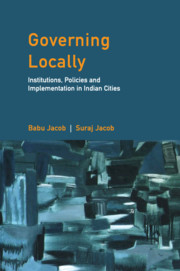
-
Select format
-
- Publisher:
- Cambridge University Press
- Publication date:
- 06 August 2021
- 09 December 2021
- ISBN:
- 9781108935944
- 9781108832342
- Dimensions:
- (228 x 152 mm)
- Weight & Pages:
- 0.55kg, 318 Pages
- Dimensions:
- Weight & Pages:
- Subjects:
- Economics, Macroeconomics
Book description
India and other countries chose a decentralised mode of delivering public services through elected local governments for increasing public welfare. However, great expectations of effective services, increased accountability and people's participation were widely belied in practice. Based on field research in cities of Gujarat, Kerala, and Tamil Nadu, the book is a detailed examination of how state and local governments function and why decentralisation outcomes vary considerably. It locates the primary reason in governance practices that compromised autonomy and capacity of urban local governments. The book demonstrates that despite a constitutional mandate for decentralised governance, policy implementation got derailed in processes threading through laws, rules, and administrative actions. It shows how habitual practices create hidden institutional rigidities that thwart policy moves despite good intentions and democratic legitimacy. The book also discusses how to navigate policy to skirt hidden threats to successful implementation.
Reviews
‘In simple and uncomplicated words, this book is path-breaking. Unlike rural panchayats, urban local self governance in India is understudied. By focusing on Trivandrum and Surat, among other things, this book gives us a deep understanding of why city governments function so differently in India. Counter-intuitive insights, especially about Kerala, abound. Urban India will become bigger and bigger in the coming years. Read this book to understand what is at stake!'
Ashutosh Varshney - Brown University, USA
Contents
Metrics
Altmetric attention score
Full text views
Full text views help Loading metrics...
Loading metrics...
* Views captured on Cambridge Core between #date#. This data will be updated every 24 hours.
Usage data cannot currently be displayed.
Accessibility standard: Unknown
Why this information is here
This section outlines the accessibility features of this content - including support for screen readers, full keyboard navigation and high-contrast display options. This may not be relevant for you.
Accessibility Information
Accessibility compliance for the HTML of this book is currently unknown and may be updated in the future.


